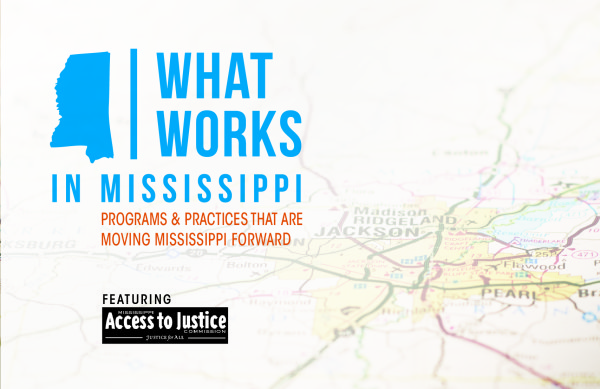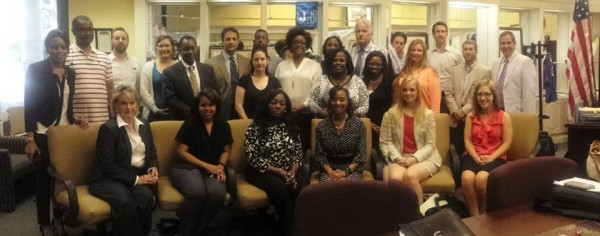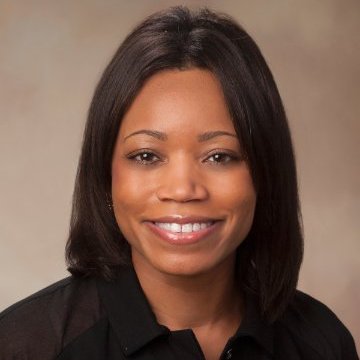What Works in Mississippi: Mississippi Access to Justice Commission
July 24th, 2015

What Works in Mississippi spotlights the good work being done to address challenges Mississippi residents face. We hope to grow our collective capacity to positively affect lives in our state and continue to spur innovative and creative solutions for Mississippi’s most challenging problems.
The Mississippi Access to Justice Commission provides overarching support for the legal aid system in Mississippi. We interviewed Tiffany Graves, Executive Director of the Commission, about a program that is connecting people who cannot afford representation to vital legal services.
The Mississippi Access to Justice Commission was created by the Mississippi Supreme Court in June 2006. Mississippi was the 23rd state to appoint such a commission. The Commission’s overall goal is to provide overarching, unifying support for the legal aid system in Mississippi. This support includes exploring means for increased funding and other resources, raising awareness of the need for and value of legal assistance, reducing barriers to access to civil justice and improving the quality and efficiency of the civil legal services delivery system.
Tiffany Graves, Executive Director | Mississippi Access to Justice
1. Please describe one programmatic aspect of your organization that you believe allows you to be most effective in doing your work in Mississippi?
The programmatic aspects of the organization that allow us to be most effective in our work in Mississippi are our Committees. The Commission is currently comprised of three Committees – Delivery System, Public Awareness and Resource Development – and two Subcommittees – Faith-Based Initiatives and Medical-Legal Partnership. The Delivery System Committee oversees the development of an expanded and improved system for providing civil legal services to low-income people. The Resource Development Committee is tasked with developing a long-term plan to increase funding to civil legal services programs. The Public Awareness Committee works to educate the Bar, governmental leaders and the public about the scope of the need for legal services. The Faith-Based Initiatives Subcommittee seeks to foster partnerships between the legal and religious communities in Mississippi to help expand access to justice to the state’s poor. Finally, the Medical-Legal Partnership Subcommittee was formed to explore ways the legal and medical communities can work together to reach more Mississippians in need of assistance. Our Committees meet regularly and they work hard to promote access to civil legal services for all in Mississippi.
2. What were some of the initial needs that you saw in the state or a specific community that led you to undertake this work? Be as specific as possible.
At the time the Mississippi Commission was created, our state ranked 49th in overall funding per person for civil legal services – $11.18. One of the most debilitating problems for poor people and communities is the lack of access to lawyers and the legal system in civil matters impacting fundamental human needs. Legal needs studies conducted by the American Bar Association and other groups in the state and out of state consistently document that only 20% of the civil legal needs of low- and moderate-income people are met. The percentage is even less in Mississippi. Mississippi’s Legal Services Programs are woefully understaffed and underfunded. The programs are more reliant on federal funding than many other states where programs have raised substantial funds through private bar campaigns and significant levels of state funding. In addition, the programs only serve individuals who are 125% below the Federal Poverty Level, leaving out the so-called “working poor” who are also without the resources to afford legal counsel. While there are other legal service providers in the state to assist those above 125% of poverty, those programs quickly reach capacity and have to turn away more prospective clients than they are able to serve. The result: a gap in services that is commonly referred to as the “justice gap.”
Recognizing the need for a single unifying entity to bring together the various providers of civil legal services and in an effort to address Mississippi’s “justice gap,” the Commission was established and empowered by the Mississippi Supreme Court to, among other things, identify the current and future needs of the legal services community and develop and establish a strategic statewide plan for delivery of legal services to the poor.
3. What are some of the challenges your organization continues to face? Be as specific as possible.
Current figures show that over 688,000 Mississippians live at or below the federally-established poverty threshold. That is 688,000 people who will likely have a legal issue – civil or criminal – for which they will likely need legal representation and not have the means to pay for it. And, unlike in the criminal context, there is no right to counsel in civil proceedings, including in child welfare proceedings where parental rights are at stake. The demand for civil legal aid far outstrips the resources available and as a result, many are navigating high-stakes legal situations—in which their families, homes, and livelihoods are on the line—on their own. With one legal services lawyer per every 18,000 eligible individuals, and our legal services programs turning away one client for every two who seek help, the challenges are great. There is little legal support for domestic violence clients. Individuals who seek civil restoration of their past criminal records have only one legal service organization to which to turn. Only three legal service providers are regularly handling foreclosure matters and for two of those organizations that assistance may only be short-term based on funding. There is an extreme shortage of Spanish- and Vietnamese-speaking attorneys in Mississippi to help clients in those population groups. The state’s elderly—many of whom are legal aid clients—face particular challenges such as transportation to remote legal aid offices and court hearings. The majority of the state’s counties do not have legal services offices. And, where legal services offices do exist, they are not visible enough in communities. Finally, and likely the biggest challenge, is funding. We need additional funding for Mississippi’s Legal Services Programs to provide resources to handle 200,000-250,000 cases per year. Our programs are not even coming close to those numbers, which only widens the justice gap in our state.
4. What are some of the positive outcomes your organization is seeing from the program you described in addition to community change perspective?
In spite of the challenges, we have experienced many successes in the past nine years. We worked with the Mississippi Supreme Court to pass amendments to the Mississippi Rules of Professional Conduct to allow attorneys to limit the scope of, or “unbundle,” their representation with the informed consent of clients. These so-called “unbundling” rules have expanded pro bono options for attorneys by making it easier for them to participate in nonprofit legal services programs. We regularly sponsor local access to justice events, including legal clinics and “Know Your Rights” workshops, to encourage local bar associations and community leaders to work together to ensure access to the judicial system for all on a local level. We are developing forms for self-represented litigants in divorce, emancipation and name change matters. The forms will be made available to low-income individuals through the legal aid programs. We are also exploring new ways to generate revenue for our legal service providers. Finally, through our new Subcommittees—Medical-Legal Partnership and Faith-Based Initiatives—we are more strategically reaching into our communities to identify and investigate the scope of the need for civil legal services and mobilize partners to help us direct people to the right places to find legal assistance. We are excited about these new collaborations and view them as critical to change the narrative about civil legal aid and people in poverty.

Jackson Expungement Legal Clinic Volunteers | 2015
5. Please share a success story from this program.
In June of this year, we co-sponsored expungement events in Biloxi, Clarksdale, and Jackson. For those unfamiliar, individuals with prior criminal records may get their records cleared through a process called expungement, if they meet certain requirements and have past charges that are eligible to be cleared under state statutes. The two-part events started with a “Know Your Rights” workshop where a volunteer attorney discussed what qualifies for expungement in Mississippi and how to obtain an expungement. A few weeks later, individuals with charges eligible for expungement returned to a legal clinic where they met with pro bono attorneys who drafted petitions and orders for expungement and advised them of where to file the documents, how to set the court hearing, what to say in court, and what to expect after the court hearing. As mentioned, only one legal service program is providing direct representation in expungement matters, but estimates are that thousands of people need this type of assistance in Mississippi. Over 200 people attended the workshops and clinics. Forty volunteers screened, advised and prepared legal documents. The Jackson event was the most successful. Twenty-five attorneys, law students, and paralegals volunteered at that event. Most of them are pictured in the photograph that accompanies this response. Since the events, we have heard from individuals from all three cities who have successfully applied for employment now that their criminal records have been cleared. Others have been able to seek job promotions, find better housing, and secure critically-needed state and federal benefits. By identifying this gap in civil legal services, and with the support of our community partners, we were able to help residents of the state restore their lives and await better futures.






